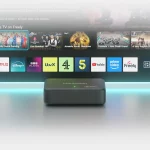Government to Splash £500m on OneWeb Broadband Satellites

The UK Government will reportedly invest around £500m (equity) into British-registered space company OneWeb as part of a wider private-sector consortium bid. The firm has been busy building a global network of Low Earth Orbit (LEO) satellites for ultrafast broadband, but as part of the deal it may have to deliver GPS too.
Until late March 2020 OneWeb (here) was still in the process of building a large constellation of 648 compact Low Earth Orbit (LEO) satellites in order to achieve full global coverage by the end of 2021 (74 have already launched) and in theory this constellation could grow to 48,000 (here), although that would be subject to demand and is currently a bit pie in the sky.
The low altitude of such spacecraft enables them to deliver significantly lower latency, while “fibre-like” broadband ISP speeds were anticipated for end-users in even some of the remotest parts of the world (an early test from last year hit speeds of 400Mbps and an average latency of 32ms). But in order to do that you need hundreds and, ideally, thousands of LEOs in order to maintain coverage.
Advertisement
By comparison the huge double-decker bus sized geostationary orbit (GEO / GSO) satellite(s) of old sit many times higher above the earth (distance of about 35,000km+ vs around 500-1300km for LEOs) and have significant coverage, but their snail like latency times and limited capacity are a disadvantage for broadband performance. Likewise each one takes years and hundreds of millions to build, which makes them slow to adapt to demand.
https://www.youtube.com/watch?v=YIrIt0R47Z8
In other words, large networks of relatively inexpensive LEOs – these are designed with a short lifespan and after that they will de-orbit to help control “space junk” – could deliver superior performance and have less trouble adapting to rising demand. On the other hand they’re technically challenging to develop and the initial costs of launching an operational global network are still significant.
OneWeb’s Financial Woes
Unfortunately satellite operator OneWeb, which has already had c.$3bn of investment from SoftBank, is the kind of high risk space company that has to spend vast amounts of money before being able to make any income (most are like that but LEO constellations on this scale are an entirely new field).
Advertisement
Suffice to say that money worries are a fact of life for OneWeb and their on-going problems recently combined with the arrival of COVID-19 to create a perfect storm, which forced them to file for voluntary relief under Chapter 11 of the Bankruptcy Code in the USA. Since then they’ve been desperately hunting for a buyer, with rival Amazon known to have shown an interest (among other groups from France and China etc.).
Despite this a report in the FT (paywall) claims that the UK Government has decided to invest £500m to help rescue OneWeb as part of a wider private-sector consortium bid, which would potentially see them holding a stake of up to 20% in the company. But there are a couple of rather significant catches.
Firstly, the UK wants OneWeb to move its manufacturing base out of the USA and on to our shores. Secondly, the Government wants OneWeb to adapt its LEOs in order to support an innovative new global positioning technology from Satellite Applications Catapult, which it believes would be cheaper than investing £4bn to £5bn in order to develop its own system (seen as necessary now that Brexit has lost the UK access to the EU’s Galileo system).
The USA appears to be opposed to the idea of the UK developing its own system to rival GPS, but one using LEOs would be different as they would in theory act more as a complement and enhancement to GPS. The report claims that US Defence officials thus favour the OneWeb approach.
Advertisement
Risk vs Reward
In theory the Government’s approach makes sense, but on the slip side OneWeb is still an unproven business and they’re up against much better established giants, such as SpaceX. Similarly the idea of using LEOs to do GPS certainly has merit, although it’s unclear whether this will compromise their original purpose for broadband.
Lest we forget that the Prime Minister, Boris Johnson, has put £5bn on the table to help spread “gigabit-capable” broadband to every home by the end of 2025, which will focus on the final 20% of premises. Admittedly OneWeb’s network doesn’t seem likely to deliver 1Gbps to each home, but as a measure of last resort it could still have a role to play (government frameworks often set a lower minimum speed threshold), such as in a small proportion of extremely remote locations where neither fixed line nor mobile can feasibly connect.
The Government also risks becoming the target of rising anger from astronomers, particularly if the LEOs turn out to be as disruptive to astronomical observation science as feared. SpaceX’s rival Starlink network has already given us a few hints about that, which is despite the fact that none of these new LEO constellations are currently anywhere close to their future size.
Lest we forget that OneWeb got to this point by burning through a large pile of money and it’ll surely burn through much more before achieving enough coverage to make it viable. Suffice to say that there’s a sizeable level of risk in this sort of venture and the rewards remain unproven.
At the same time the need to move manufacturing from the USA to UK is all well and good, but it will add additional costs and delay at a time when OneWeb really need to get back into the business of launching new satellites or risk losing vital momentum against SpaceX.
Mark is a professional technology writer, IT consultant and computer engineer from Dorset (England), he also founded ISPreview in 1999 and enjoys analysing the latest telecoms and broadband developments. Find me on X (Twitter), Mastodon, Facebook, BlueSky, Threads.net and Linkedin.
« TalkTalk’s Wi-Fi Hub Router Now Available to Biz Customers
Sky and Virgin Media Wave Goodbye to Disney UK TV Channels »





















































Whilst I’m impressed by the scope and innovation involved in this venture. The thought of 20 let alone 48,000 “Washing machine sized” satellites floating in orbit does offer some serious concern.
whys that ? if it re-enters the atmosphere it would burn up and disintegrate. There are no dangers to people on earth. Dangers in space perhaps if there are any collisions but quite safe to us on earth. The atmosphere is one giant incinerator. And we also send them off into parking orbits when they are near end of life.
UNA – they burn up and are reduced to tiny particles. That particulate matter doesn’t simply disappear out of existence.
I suppose a lot depends on whether they are on the spin or rinse cycle when they re-enter the atmosphere…
UK Company, sets up in USA, gives all the jobs to USA, does manufacturing in USA, does launches in USA.
So er, the gov is right, if they want to accept UK gov money then they need to act like a UK company and start doing business here.
The launches were conducted from Kazakhstan using Russian launch vehicles.
I think this is a marvellous idea by the British government. For one this will help complement GPS and I’m sure the US military might want to use this to help them out with their GPS too as they won’t have a LEO system in place also for the military to have secure access to a global fast broadband service at sea and in remote locations and in disaster areas and other areas such as the Fawkland Islands as well as other territories and our military bases. Plus there is the consumer side that could make enough profit to pay the UK govt back the £500 million with more on top eventually and create jobs in our own country aswell as a possible launch site for satellites been built and spoke about in the UK already this is a highly promising and possibly profitable investment by the Gov’t.
Well said.
utter bullshit, more spaffing cash up a wall for nothing.
Sat broadband is shit fullstop, latency sucks, data rate crap.
it’ll be lucky to return tuppence
I’m inclined to agree. If the Tories see this as an opportunity to give their friends lots of investment for no other reason but to make them wealthier (jobs for the Eton boys) to replace HS2 it wouldn’t surprise me one bit.
A launch site in the UK?
Triedsalty: In answer to your reply the LEO satellite system is planned to have around 30ms ping and if we are using the SpaceX information as a ground basis of what it is capable of then that is around 400mbps download which is a massive improvement over the average Internet speed available to the majority around the world including the UK. Also even if we don’t make the money back in commercial circles it may save us money from having to build and develop our own GPS system seeing as the EU won’t allow us secure access to the galileo satellite system, So 500 million is quite cheap in relation to probably starting from scratch and any money recouped from commercial revenue streams is a win win.
Buggerlugz: If its owned by the taxpayer then it’ll be fully transparent as the Gov’t did this with some banks during the credit crunch and have now made the UK loads in profit now so hopefully its the same again.
Jonny: Yeah there is a a possibility of the UK building a rocket launching platform for satellites. Here’s a link to the BBC https://www.google.com/amp/s/www.bbc.co.uk/news/amp/uk-scotland-48119118 there are other news agencies and articles reporting this also.
“…the LEO satellite system is planned to have around 30ms ping and..is a massive improvement over the average Internet speed available to the majority around the world including the UK”.
Thanks Dominic
Oh dear, more taxpayers’ money being tipped down the drain, at least it’s not as much as HS2. The coronavirus tracing app has been a failure (who would have thunk it?). Previous public sector fiascos include the NHS IT system, the Advanced Passenger Train, the Groundnuts Scheme and the R101 airship.
So what’s the market for having two of these systems up there? SpaceX is already well ahead of the game and the return on investment from those on the planet that actually need it must be very sma;;
Same as the market for overbuilding FTTP i suppose. But there we go that’s up to the people investing the money I’d normally say, unless of course its MY money ie taxes.
Still the governments no matter what flavour spend money on things people dont want or agree with or would prioritise, There’s always a big picture to view and it’s not always the obvious headline.
All those hi-tech washing machines falling to earth and burning up leaving ash of dubious toxicity to land on our planet?
10+ Millenium Bridges on borrowed funds that interest has to be paid for?
Two (maybe 3 if Chinese have theirs) existing GPS systems, is another needed? If not just for British vanity, how much could be sold to other countries? Would it be cheaper than others?
Low earth orbit might mean 30ms round trip latency to and from the satellite but that has to be added to cable transmission latency. There would have to be remote ground stations in different countries, with all the licencing issues that would raise, to make it worthwhile. Developed countries with high population density and high incomes already have terrestrial cable links and back-haul. It could benefit less well-off nations or those with widely distributed populations providing there is cheap terminal equipment (maybe a 6 or 7G phone). But that won’t pay the bills.
Radio spectrum use would require terminal equipment suitable for the high frequency, short wavelength signals which may be difficult to provide small device reliability without a strong down-signal strength. That raises the thought of eco-worriers issues with brain death, disease and so on, justifiably or not.
I’m not enough of a scientist to know whether the frequencies used or their harmonics would distort radio astronomy by blotting out element signature frequencies from distant galaxies, stars or planets but that ought to be taken into consideration especially as the proposed LEO system overlays other methods.
There are more than 3 positioning systems currently in orbit or about to be. You have GPS, glonass, Galileo, the Chinese system, and the Japanese Australian joint venture.
most of those systems provide extended / better coverage for a local area/country. E.g India’s nav system only helps India, it isn’t orbiting over say UK or EU.
Spaf. https://www.theguardian.com/science/2020/jun/26/satellite-experts-oneweb-investment-uk-galileo-brexit
https://www.theregister.com/2020/02/05/galileo_uk_clause/
A nice idea but does anyone actually believe our government could pull this off without bleeding a load of cash on it? The project would likely go massively over budget and fail to deliver its primary objectives and then if it ever did get to a stage of going live and being usable, the government would then probably privatise it, selling its share to one of their buddy’s for a fraction of the amount actually invested in it and then sign the country up to a crap deal of paying through the nose to use it for decades to come as it falls into obsolescence, all while lining their own pockets.
It is a bit of catch-22 though, if SpaceX do capture the LEO market, without a competitor to keep them honest they can name their price for their service and Elon is certainly not shy at charging a premium for his products.
I thought Rishi had more sense, he’s gone down in my estimate.
Most enjoyable reading all your thoughts before I actually read them I also asked myself 90% of the same questions.
I won’t repeat what has been said as I believe all the above points seem valid.
However, after UK losing access to the EU’s Galileo satellite navigation system, I have to say when Theresa May stated “so we will build our own and we can achieve within 3 to 4 yrs.. I felt that’s the way to go. Galileo system is already out of date (first test 2005 then followed by the first satellite 2011) so building a wonderful new system would be a great idea especially as we had significant input in building the Galileo system and already have the techno. Now I hear they have put the idea to bed and trying to piggyback on the Broadband system. (can you imagine, hold on satnav the FA is on ) Thinking outside the box.. if we had a system superior to the American GPS (even older than Galileo, but they are upgrading slowly) they are not likely to be in favour of us having a superior system.
Don’t get me wrong, the GPS is an amazing system.
How many out there feel that the Starlink and now the OneWeb is preparing for AI cars.
This will improve the 5G coverage. I Agree with this
When even the government’s own UK Space Agency (and other experts in the field) criticize the OneWeb purchase, you’ve got to doubt the wisdom of this bid.
Generally, I’m not a fan of thousands of LEO junk bots littering our inner space to feed the cats chasing laser pens addiction.
I am not a scientist… nor is anyone in the government a scientist… In view that oneweb has already been bankrupt once, shouldn’t this ‘deal’ be given much greater scrutiny? It is an awful lot of money and the pros and cons don’t seem to be clear and the technology does not seem to be entirely sound and … who actually owns oneweb if all the work is done in the US?
OneWeb satellites will cost billions and their entire purpose will be delivering Facebook spam to everyone on planet Earth with a device. You just won’t be able to escape the signal unless you buy a nuclear bunker or a hammer!
Even the previous Spambook Satellite chose to self destruct on the SpaceX launchpad because it couldn’t bear an eternity of processing braindead fakebook user postings.
I consider that event SpaceX’s most finest achievement in the history of technology and it saved billions of inboxes filling up with mindless Zuckerberg sponsored cr4p.
This is appalling, it is not even a gamble made by people that barely understand basic mechanics. We are talking about small satellites that use a low orbit that is completely different from GPS systems (1200 vs 20.000km), orbit distance that make them not suitable to be repurposed as positioning system as you would need hundred thousand of them, not 650 (that would ensure only a minimal basic coverage for internet connection), add the fact that for various reason ,including safety, these satellite are short lived as when they are deployed their orbit is a slow negative drift that makes then reenter the atmosphere and burn in 5 years or so.
The economic side is also a big gamble, covid aside , the monetary sustainability model is unproven , SpaceX may takes years , even a decade before the first positive returns and we are talking about a company that need only a few thousands satellites a thanks to their reusable rockets platform it has one of the lowest cost (roughly half) to launch satellites of the entire space industries worldwide .
That’s why our own space agency thinks the OneWeb path is not viable for what uk gov intended , and again another case of mindless nationalism over expertise and proper decision making.